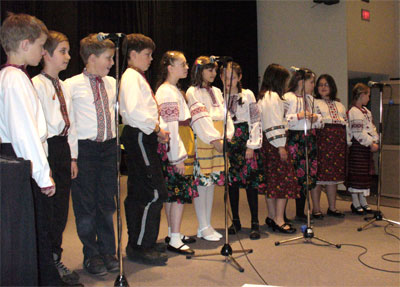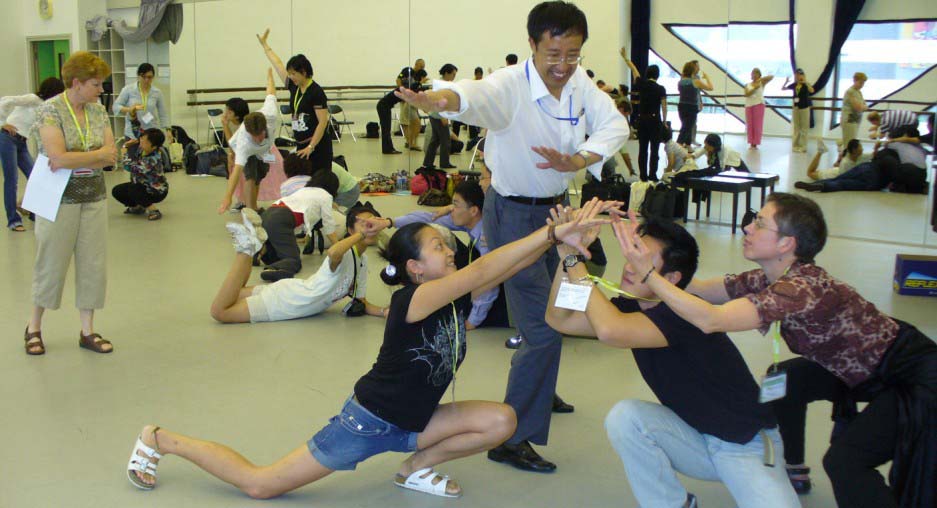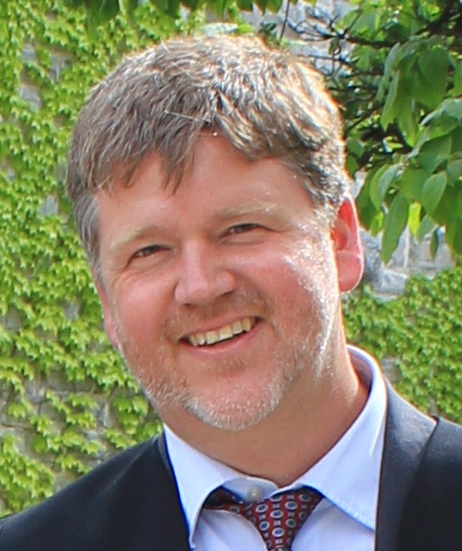
On 6 July, 2007, a UNESCO Chair in Arts and Learning was established at the Faculty of Education, Queen’s University. This was the first UNESCO Chair in the field of arts education in the world, and remains one of only two to be approved by UNESCO to date. The Chair has been active in capacity building in arts education. It collaborates with other UNESCO Chairs and Observatories in Canada and around the world.

UNESCO’s Sustainable Development Goal 4 is to “ensure inclusive and equitable quality education and promote lifelong learning opportunities for all.” The UNESCO Chair in Arts and Learning advances quality education for all by promoting the arts as a means of engaging learners and helping them achieve life-enriching personal and academic learning experiences.
Rationale
Mounting evidence indicates the value of the arts in supporting positive educational outcomes.
- Deep and meaningful learning within the arts enables students to explore experiences, relationships, and ideas in ways that often cannot be conceptualized or articulated with words or numbers; the arts provide another means of knowing and understanding.
- Making art prepares children for success not only as artists, but across professions; the capacity to perform and create in the arts requires the development of imagination, collaboration and problem-solving skills that learners can transfer to other experiences and pursuits.
- Research has identified that arts opportunities are correlated with increased academic achievement and school engagement. The arts enliven students’ experiences of other subjects. Through the practice of arts integration, teachers are able to engage students more deeply in learning content.
- Further, the arts are a fertile breeding ground for students to experience and develop creative thinking, a skill widely recognized as essential for participation in the 21st century knowledge and innovation economy.
- Perhaps most significantly, learning to perform and create in the arts provides students with immediate and long-term opportunities for continuing involvement with the arts, and all the personal meaning and joy that such engagement can bring.

Background
On 6 July 2007 a UNESCO Chair in Arts and Learning was established at the Faculty of Education, Queen’s University. This was the first UNESCO Chair in the field of arts education in the world, and remains one of only two to be approved by UNESCO to date. The Chair has been active in capacity building in arts education. It collaborates with other UNESCO Chairs and Observatories in Canada and around the world.
On 13 December 2016, UNESCO approved Dr. Benjamin Bolden as the new Chair holder, following his nomination and appointment by Queen’s University. In his role as Past Chair, Professor Emeritus Larry O’Farrell continues to support Dr. Bolden and the current and future initiatives of the Chair.
In 2017 the UNESCO Chair in Arts and Learning at Queen’s University was instrumental in initiating and became a signatory member of the UNESCO UNITWIN network “Arts Education Research for Cultural Diversity and Sustainable Development.”
- The EduArts Map – This initiative enhances access to arts education through the development of a national online map of arts opportunities. The project is a collaboration with the Canadian Network for Arts and Learning and is funded by the Ontario Trillium Foundation. Following preliminary work mapping Ontario, the map will be expanded nationally.
- Monitoring Arts Education Systems (MONAES) – This international research collaboration has involved the design, implementation and reporting of two global surveys inspired by the Seoul Agenda Goals for the Development of Arts Education (2010). The surveys examine current arts education developments in UNESCO member states.
- UNITWIN: Arts Education for Sustainable Development – UNITWIN is UNESCO’s University Twinning and Networking Program, promoting international inter-university cooperation and networking to enhance institutional capacities through knowledge sharing and collaboration. With strong support from Queen’s University the Chair played a leading role in establishing this partnership, which includes institutions in Singapore, New Zealand, Germany, Hong Kong, Australia, Colombia, Korea, Thailand, Kazakhstan, Kenya, Israel, Taiwan and Norway, and was approved by UNESCO and granted UNITWIN status on Dec. 22, 2016. The Chair will continue to work with and support this partnership, through leadership in conceptualizing and supporting partnership structures and initiatives; participating in research projects and activities; and hosting meetings and conferences.
- Re-invigorating the Seoul Agenda – The UNESCO Chair in Arts and Learning has formed a partnership with the Canadian Commission for UNESCO and the Canadian Network for Arts and Learning to lead a national and international initiative to re-engage decision makers and arts educators in the goals and strategies of this global action plan that was unanimously endorsed by the General Conference of UNESCO in 2011. The partnership places particular emphasis on aligning arts education with the goals of the Incheon Declaration and Framework for Action, UNESCO’s Sustainable Development Goals and Habitat III, UNESCO’s New Urban Agenda.
- Research: Building Creative Capacity through Assessment for Learning in the Arts – This in-depth Ontario-based qualitative exploration of building creative capacity through assessment for learning in the arts will engage 48 secondary school dance, drama, music, and visual arts teachers and students in a 2-phase sequential research design. The primary objective is to identify, analyze, and describe the assessment learning strategies that arts teachers productively employ to nurture students’ creativity.
- Arts Education Yearbook Publication – In support of international arts education knowledge mobilization, the chair will contribute to the biennial production of a yearbook that features contemporary arts education research from around the world. The current yearbook, Key Issues in Arts Education around the World: Comparative Research and Reflection Six Years after the Seoul Agenda, edited by Benjamin Bolden (Canada), Ernst Wagner (Germany) and Teunis IJdens (Netherlands) will be published in December 2017. The following yearbook, documenting research and activities of the Arts Education for Sustainable Development UNITWIN, will be published in December 2019.
- Biennial Symposia – Alternating national and international symposia will bring together arts education researchers and practitioners to share research, knowledge and practices, with a focus on specific arts education topics. The next symposia, slated for Spring 2018, will focus on Nurturing Creativity in the Arts.
- Academic Support and Development – The chair will support graduate students through targeted UNESCO Chair in Arts and Learning Fellowships that will provide funding for students to engage in Chair activities and research.

Associate Professor
Holder of the UNESCO Chair in Arts and Learning
Contact Information
Email: ben.bolden@queensu.ca
Biography
Dr. Benjamin Bolden, music educator and composer, is an associate professor and UNESCO Chair of Arts and Learning in the Faculty of Education at Queen’s University, Canada. His research interests include arts education, music education, the learning and teaching of composing, creativity, arts-based research, assessment in the arts, teacher education, teacher knowledge, and teachers’ professional learning. His research has been published in journals including Review of Education, Teaching and Teacher Education, Music Education Research, and Music Educators Journal. As a teacher, Ben has worked with pre-school, elementary, secondary, and university students in Canada, England, and Taiwan. Ben is an associate composer of the Canadian Music Centre and his compositions have been performed by a variety of professional and amateur performing ensembles across Canada and internationally.
Research Interests
- Arts education
- Music education
- Creativity
- The learning and teaching of composing
- Arts-based research
- Assessment in the arts
- Teacher education
- Teacher knowledge
- Teachers’ professional learning
Recent Publications
- Bolden, B., Corcoran, S., & Butler, A. (2021). A scoping review of research that examines El Sistema and Sistema-inspired music education programs. Review of Education. (in press).
- Bolden, B. (2020). Teaching with and for aesthetic experience: Baking buns for Mrs. Blinks. European Journal of Curriculum Studies, 5(2), 886-897.
- Bolden, B., & Beach, P. (2020). Integrating music and literacy: Applying music concepts to support prosody and reading fluency. General Music Today, 34(2), 5-12.
- Bolden, B., DeLuca, C., Kukkonen, T., Roy, S., & Wearing, J. (2020). Assessment of creativity in K-12 education: A scoping review. Review of Education, 8(2), 343-376.
- Beach, P., & Bolden, B. (2018). Music education meets critical literacy: A framework for guiding music listening. Music Educators Journal, 105(2), 43-50.
- Kukkonen, T., & Bolden, B. (2018). Teaching lives: An arts-informed exploration of teacher experience. Art/Research International 3(2), 150-171. Bolden, B. (2017). Music as method: Musically enhanced narrative inquiry. International Journal of Education & the Arts, 18(9), 1-19.
- DeLuca, C., Bolden, B., & Chan, J. (2017). Systematic professional learning through collaborative inquiry: Examining teachers’ perspectives. Teaching and Teacher Education, 67, 67-78.
- Bolden, B., & DeLuca, C. (2016). Making space for the magical: Leveraging assessment as an incitement for emergent learning. Assessment Matters, 10, 52-71.